Articulate Impact Report 2024

Letter from the CEO
It all started, as the best heroic journeys do, with a conversation in the pub.
Many years ago in a suburb far far away, I was talking to my friend John about his business, which helped older people and their families live brighter lives. He said he was thinking of becoming a B Corp. I said, “A what now?” Being a geek, I had to research it and, inspired by what I found, the quest began.
Almost ten years later, Articulate Marketing is a B Corp. We are carbon neutral. We are committed to sustainable development goals. We are Investors in People Gold accredited.
More importantly, the whole business has evolved and progressed over the years. Inspired by B Corp ideals, our commitment to people, planet and prosperity now runs through everything we do, like the letters in a stick of rock. We describe ourselves as a ‘progressive marketing agency’. We believe that marketing can be force for good, especially when we help values-aligned clients make the world a better place.
Years ago, someone sent me a reusable coffee cup as a gesture toward waste reduction and environmentalism. It was a nice gift, but it also troubled me: there’s more to sustainability and progress than tchotchkes. This is why it’s so important to go beyond gestures. Objectively audited standards like B Corp and Investors In People mean that we are not marking our own exam papers. They keep us honest and help us improve.
In the same spirit of accountability, we are publishing this impact report to review our progress and set goals and commitments for the future. We’re still on the quest that began in The Swan all those years ago. Are we there yet? No. Are we making progress? Yes, absolutely. And now we have a map!
At a glance
Certified B Corp
We are a proudly certified B Corp and have been for six years now. And, we have been several times awarded ‘Best for the World Honourees’ in our journey to being a business that is a force for good.
Committed to Net Zero
As a Climate Positive Employer, we are dedicated to achieving official Net Zero status by 2030 or earlier. We’ve planted around 20,000 trees and offset more than 300 tonnes of carbon.

Investors in People
We are certified as IIP (Gold) and won their ‘Small Employer of the Year’ award in 2022. This is thanks to our company culture, governance, values, inclusive policies, benefits and employer branding.
Table of contents
- Introduction
- A timeline of our journey so far
- The 5 pillars of sustainable development
- Prosperity
- People
- Planet
- Looking ahead
Introduction
At Articulate Marketing, we think about our impact — a lot.
We think about our impact on employees, on clients, on our industry, on the planet, and how to do meaningful work that impacts the bottom line (of course).
Our core mission is about building a Difference Engine for B2B businesses. By that, we mean using differentiating brand strategies and marketing best practices to elevate ambitious organisations above competitors and to attract a loyal audience. We aim to inspire and empower clients to make the world a better place.
The phrase is a homage to the invention of the same name created by Charles Babbage and Ada Lovelace, considered by many as the founders of computing. The original Difference Engine was a complex machine that solved big problems. Since its inception, it’s made a huge difference to how we live our lives today, too.
In the same vein, we want our mission to reflect that level of impact: tackling complexities (like climate change) and making a tangible, positive difference. While 62 percent of people believe it is crucial that companies behave in a more sustainable way, 83 percent of employees think their current employers are not doing enough to mitigate climate change. Well, we’re taking a stand. Our own Difference Engine is no fossil-fuel-guzzling four-by-four: it’s eco-friendly and helps us travel in the right direction. And it’s got cup-holders.
Saying all this, our impact has not always been as front of mind. We’d be the first to admit it. When the business was founded almost 25 years ago, the main consideration, like any new business, was getting clients and making profits. And we’ve not suddenly become a charity in the interim. As a B Corp, we’re a for-profit agency to this day. The difference is, we’re a business that is a force for good, one that has embedded the triple bottom line into every aspect of what we do: People, Planet and Profits.
It’s been a challenging road. We’ve had to take a hard look at every aspect of our company and employ the spirit of radical candour to evaluate our impact. This report details much of this effort, and what we plan to do moving forward. Some of the things we’ve done beyond becoming a B Corp have included updating our policies, getting Investors in People certified, committing to Net Zero by 2030, planting tens of thousands of trees and avoiding hundreds of tonnes of CO2.
The change over the years in how we make decisions about suppliers and clients and just about everything is night and day. This mindset shift has become absolutely vital to doing good business, in our book. So, check out how we got where we are today, and come along for the journey towards a bright future. Obstacles beware: our engine is mighty.
This is our very first impact report.
While we’ve made every effort to be as transparent as possible about our progress on social media, emails on our website and other communications, we felt it was time to bring everything together into one report. That way, you get the full picture.
As such, this is a baseline of where we’ve been and where were are now. It also covers our ambitions for the future. Reports from this point will therefore track progress against this baseline.
Our aim is to hold ourselves to account. So, new reports will be published each year detailing progress on our targets. See this page for updates.
Articulate Marketing is a UK-based remote-working marketing agency, B Corp and HubSpot expert partner.
Founded in 2003 by Matthew Stibbe, the company has grown into a 20-person team. These skilled individuals deliver marketing services for ambitious B2B technology clients. We like to work with purposeful companies that make a positive difference for customers and that leverage technology as a force for good.
Articulate prioritises differentiation in our marketing approach, offering strategic, copywriting, website, and HubSpot services to help clients transform their businesses. In other words, we can help you build your ‘Difference Engine’ to accelerate growth, elevate your brand and win customers.
Clients include purposeful SMEs and mid-market tech companies in various sectors like health and environmental tech. We’ve received multiple certifications and awards, reflecting our commitment to excellence.
We are a progressive marketing agency. We inspire and empower our clients to make the world a better place.
A timeline of our journey so far
2003
Articulate Marketing was founded by Matthew Stibbe
As a fully remote agency, Articulate values flexible working and saying no to long commutes. All our work is digital.
2010
Turbine, our sister company, was founded
Turbine is a paperless application for expenses and time-off requests, which solved a problem for us and is available to purchase.
2013
Joined the HubSpot Partner Programme
Being an accredited HubSpot solutions partner, Articulate is able to offer an expanded range of marketing, sales and website capabilities.
2014
Doubled down on happiness and learning culture
As we grew, we introduced more initiatives to support employee happiness and wellbeing, and benefits such as a company Kindle.
2014
Worked with HR consultants to establish robust policies
Continuously updated in the decade since, our policies are extremely comprehensive and are available on the company intranet.
2017
Became a Real Living Wage Employer
Articulate offers (as a minimum) the Real Living Wage for all full-time employees, as calculated based on the cost of living.
2018
*Certified as a B Corp with a score of 86.9
We became a certified B Corp — a business that is a force for good. See below for more details about the B Corp movement.
2019
Started carbon offsetting with Climate Care/Climate Impact
In order to offset the carbon footprint for any travel for company meetings or client meetings, we partnered with this fellow B Corp.
2019
Awarded ‘Best of the World Honouree’ top ten percent
Awarded global top ten percent B Corp ‘Best for the World Honourees’ for 'Governance' and 'Workers' categories.
2020
Achieved Investors in People (Standard) status
IIP has been offering accreditations to those organisations that have provable high standards for people management.
2021
Appointed a highly experienced Chief Financial Officer
Mirela Mart is a veteran of Visa Europe, GE Capital and The World Bank, and strategically oversees our financial operations in alignment with our long term business goals.
2021
Developed the Difference Engine mission, targeting purposeful B2Bs
We began thinking more purposefully about our clients and how we can make a positive difference for them, and therefore the world.
2021
Awarded ‘Best of the World Honouree’ top five percent
Further awarded global top five percent B Corp ‘Best for the World Honourees’ for 'Governance' and 'Workers' categories.
2021
Re-certified as a B Corp with a score of 91.6
B Corp is always evolving its criteria to ensure standards are high. We were thrilled to score a higher result during our 3-year recertification.
2022
*Made our commitment to Net Zero by 2030 on the SME Climate Hub
We made our commitment to Net Zero via the SME Climate Hub. See below for more details about Net Zero.
2022
Signed the Mental Health at Work Commitment
The Mental Health at Work Commitment is a framework based on the Thriving at Work standards for UK employers.
2022
Continued carbon offsetting as a Climate Positive Employer with Ecologi
Ecologi (a fellow B Corp) allows us to track our Net Zero progress. We have planted nearly 20 thousand trees and avoided 300 tonnes CO2.
2022
Achieved Investors in People (Silver) status
We completed our second IIP assessment and achieved Silver status, recognising our commitment to supporting and developing people.
2022
Won Small Employer of the Year
Thanks to further investment in our learning culture and data-driven processes, we were honoured to win this award from IIP.
2022
Appointed a Head of People to an in-house HR role
Juliet Glanville is our in-house HR resource to elevate our recruitment, policies, people culture and employer branding.
2022
Won HubSpot’s HEART award for diversity, equity and inclusion
HubSpot’s annual HEART Award is a global recognition of a partner agency’s dedication to DEI, awarded to one partner each year.
2023
Roll-out of learning paths, wellbeing learning paths and SDG lunch & learns
Through 2022-2023 we created learning paths around key skill areas, and began a series of SDG awareness seminars, completed in 2024.
2023
Achieved UK Company Culture awards finalist in MH category
We were honoured to be finalists at the UK Company Culture awards for the category of ‘Best Mental Health initiative’.
2023
Achieved UK Agency awards finalist for B2B Agency of the Year
We were honoured to be finalists at the UK Agency awards for the category of ‘B2B Agency of the Year 2023’.
2024
Achieved Investors in People (Gold) status
Only 28 percent of IIP-accredited organisations achieve the gold standard. Moreover, it is another step on our journey.
2024
Published ‘The Difference Engine: An Articulate Marketing Guide’
This book represents our effort to give back to marketers and business leaders, share our knowledge and lift everyone up.
*Key milestone — B Corp certified
Society’s most challenging problems cannot be solved by government and non-profits alone. The B Corp community works toward reduced inequality, lower levels of poverty, a healthier environment, stronger communities, and the creation of more high-quality jobs with dignity and purpose. Harnessing the power of business, B Corps use profits and growth as a means to a greater end.
At the time of writing, there are more than seven thousand B Corps, with over 1500 in the UK alone. This is truly remarkable given the rigorous assessment criteria against five pillars: governance, workers, community, the environment and customers.
By becoming a B Corp, Articulate Marketing took the opportunity to get a qualified third-party assessment of our impact, rather than marking our own homework. B Corps have to resubmit for certification every three years. This is just one of the ways we track progress and hold ourselves to account.
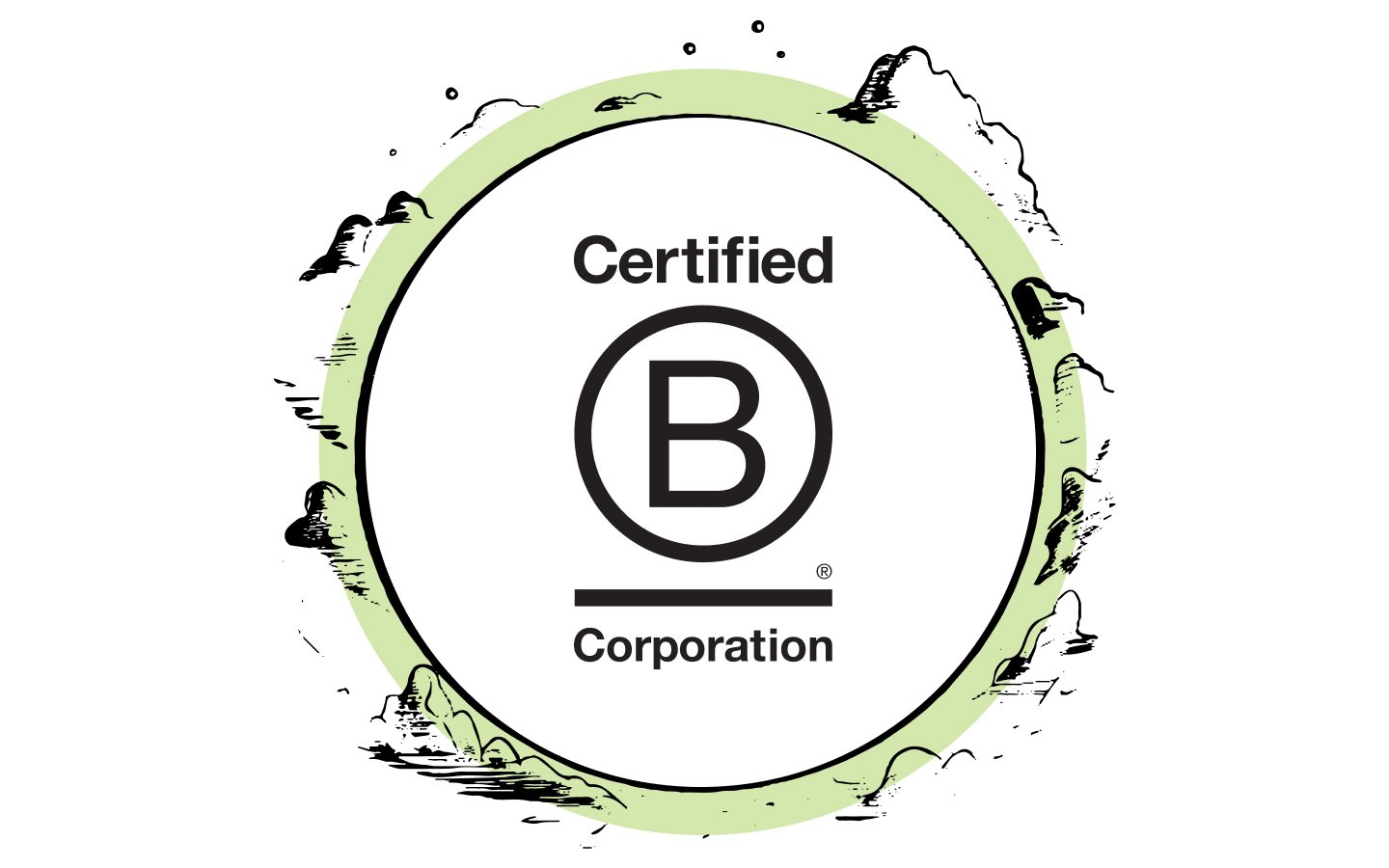
*Key milestone — Commitment to Net Zero
by 2030
Net Zero is the internationally-agreed path to mitigate global warming, a major contributor to climate change. If temperatures rise by more than 1.5C then scientists predict catastrophic effects, such as extreme weather, mass extinctions and population displacement.
‘To ‘go Net Zero’ is to reduce greenhouse gas emissions and/or to ensure that any ongoing emissions are balanced by removals.’
Net Zero isn’t just for these large multinationals. Every business, no matter the size, must work towards this goal for it to succeed. So, in 2022, Articulate Marketing committed to Net Zero by 2030, or earlier if possible. We aim to proactively reduce our emissions and offset everything else as quickly as we can, because the journey matters just as much as the destination.
Thanks to fellow B Corp Ecologi — we are a Climate Positive Employer. As a fully remote business with no office premises, we have a minimal carbon footprint and take many steps to offset our carbon impact, measuring progress via our company scorecard dashboards on Power BI. We’ll talk about this more in our ‘Planet’ section below.
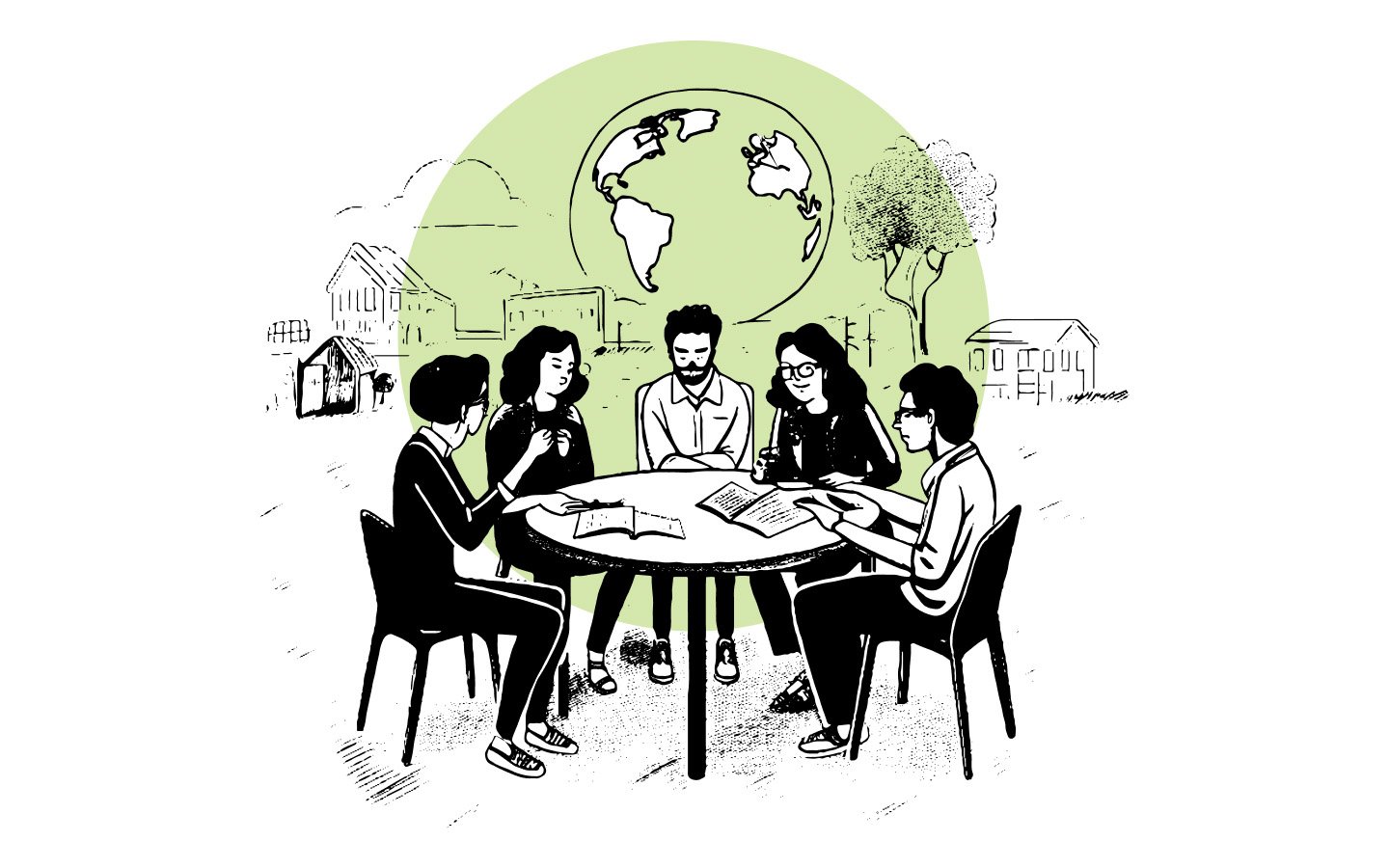
The 5 pillars of sustainable development
As a marketing agency, we often talk about ‘random acts of marketing’ with our clients: meaning, well-intentioned attempts to do the right thing, but ungoverned by an overarching strategy. The same principle applies to sustainability. It became clear that we needed to move from a model of ‘random acts of good’ to a more strategic, purposeful approach to our impact as a business.
In our research, we found no better model than that adopted by all United Nations member states: the Sustainable Development Goals, or SDGs for short. This is, in the UN’s words, ‘A shared blueprint for peace and prosperity for people and the planet, now and into the future.’
At a macro level, these goals can be categorised into five pillars of sustainability
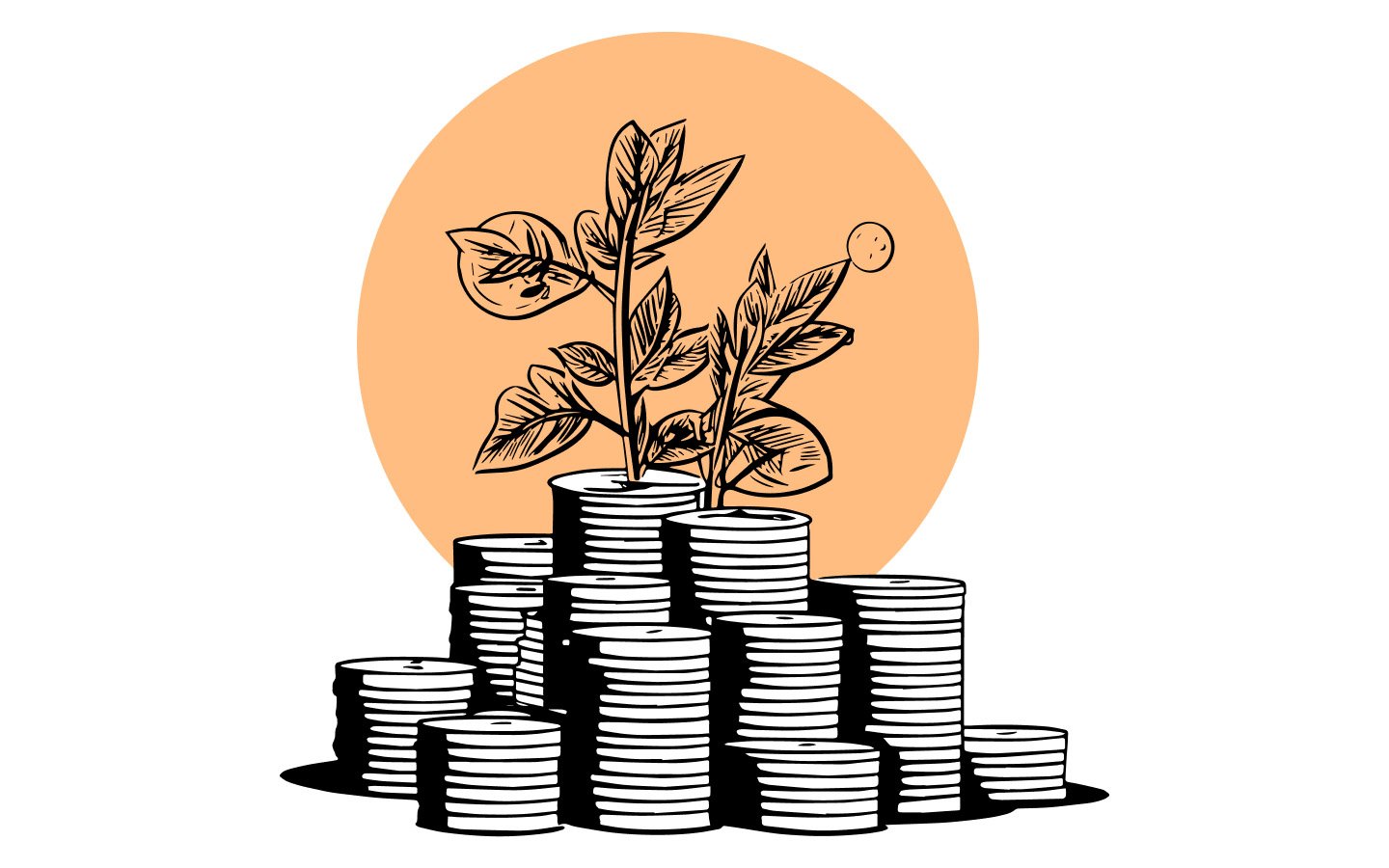
Prosperity
‘We are determined to ensure that all human beings can enjoy prosperous and fulfilling lives and that economic, social and technological progress occurs in harmony with nature.’
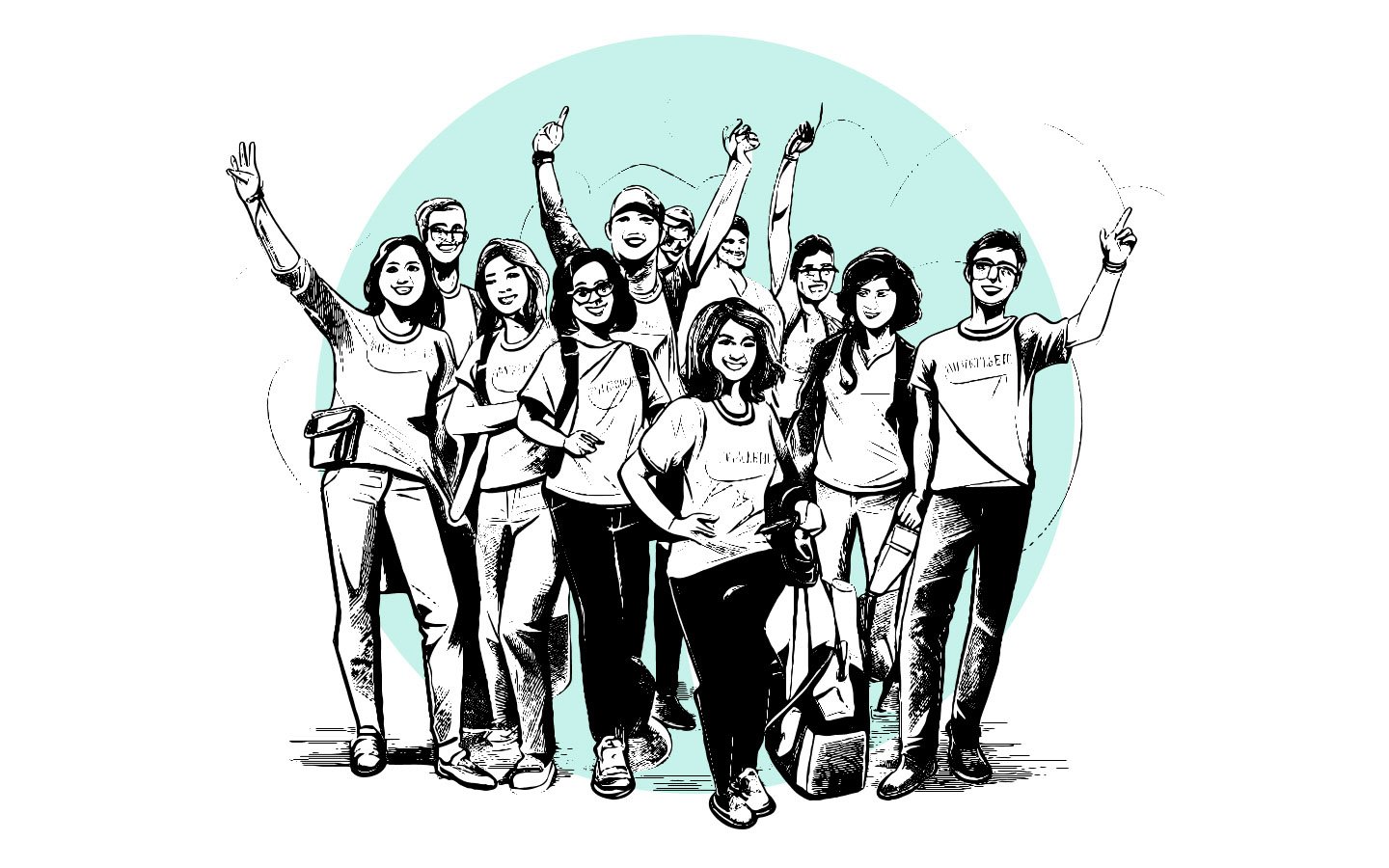
People
‘We are determined to end poverty and hunger, in all their forms and dimensions, and to ensure that all human beings can fulfil their potential in dignity and equality and in a healthy environment.’
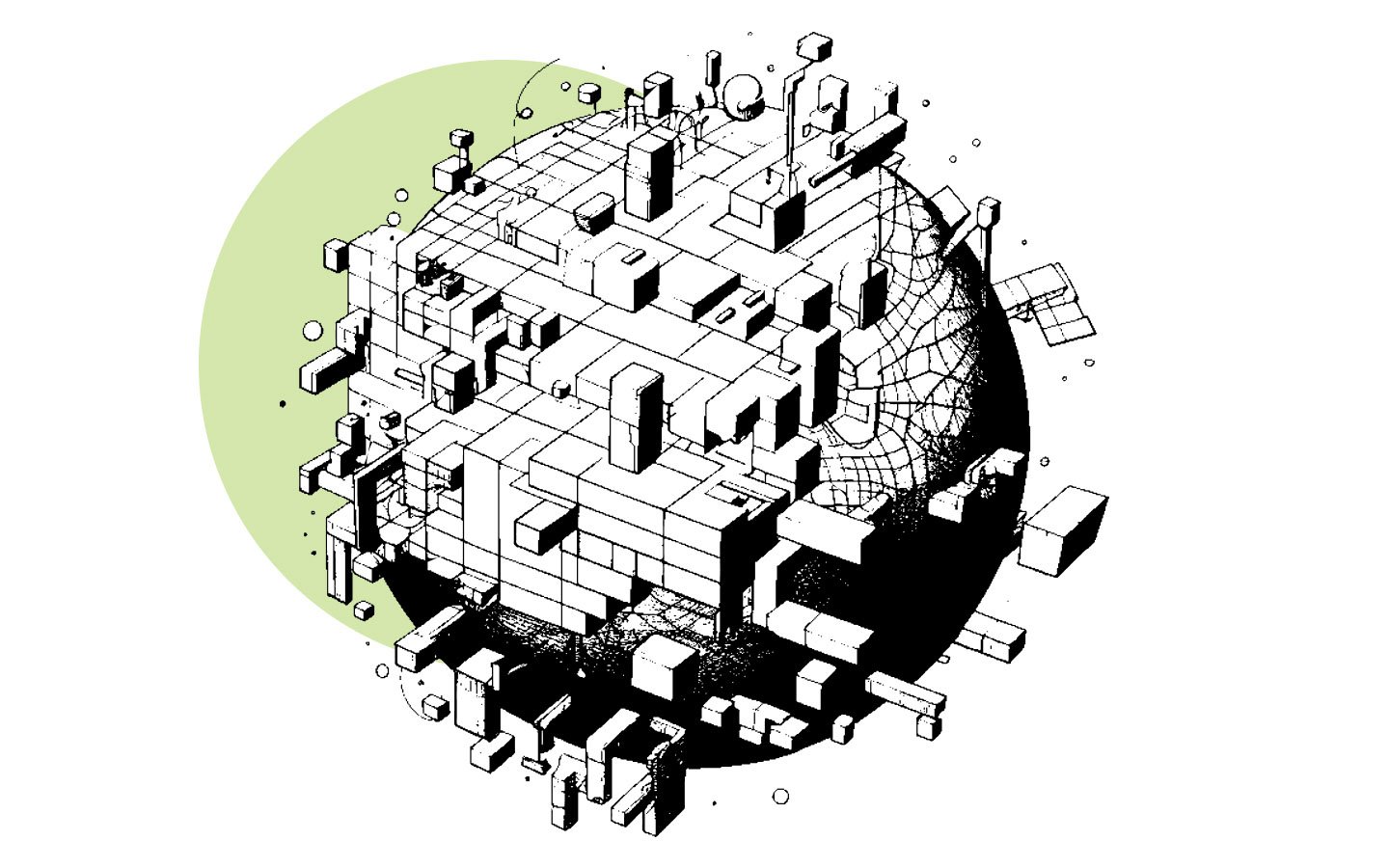
Planet
‘We are determined to protect the planet from degradation, including through sustainable consumption and production, sustainably managing its natural resources and taking urgent action on climate change, so that it can support the needs of the present and future generations.’

Peace
‘We are determined to foster peaceful, just and inclusive societies which are free from fear and violence. There can be no sustainable development without peace and no peace without sustainable development.’

Partnerships
‘We are determined to mobilize the means required to implement this Agenda through a revitalised Global Partnership for Sustainable Development, based on a spirit of strengthened global solidarity, focused in particular on the needs of the poorest and most vulnerable and with the participation of all countries, all stakeholders and all people.’
To help us focus our efforts in a more strategic and impactful way, we chose to prioritise certain SDGs that fell within the ‘Prosperity’, ‘People’ and ‘Planet’ pillars, and have formatted this report accordingly. While we’re all for world peace, it is in these three areas where we feel we can do the most good, and that are most relevant to us as a business (rather than a nation — the United States of Articulate, anyone?).
Sustainable Development Goals (SDGs)
In 2015, a global partnership of countries agreed on 17 goals to be achieved by 2030. This was an ambitious call to action. And, at the halfway point, there’s still a long way to go. To learn more about progress towards these goals, download the latest SDG report, here.
The goals were based on decades of work by these countries to research and understand the complex relationships between considerations like poverty and climate change, equality and justice.
For example, how can a “developing” nation grow economically and raise living standards while avoiding the environmental toll levied by industrialisation? Is the answer to punish a nation for doing exactly what other nations have done to get ahead? Or is it, rather, to find ways to support sustainable development and learn from the past, raising people out of poverty while also looking after the planet? While the latter answer may seem obvious, achieving that is not easy and requires a multi-touch approach. This thinking is what fuelled the creation of the goals.
These are the 17 SDGs and how they relate to the five pillars of sustainable development:
People
Planet
7) Affordable and clean energy
11) Sustainable cities and communities
Prosperity
8) Decent work and economic growth
9) Industry, innovation and infrastructure
12) Responsible consumption and production
Peace
16) Peace, justice and strong institutions
Partnerships
17) Partnerships for the goals
One of the ways we keep ourselves in the know about the SDGs is a regular lunch and learn, which we have been running throughout 2023 and 2024. Each session covers one SDG, what it means, and includes a brainstorming session for how we can do more to contribute. These 17 sessions are recorded for future reference.
How businesses can contribute
The SDG framework is obviously very wide-ranging. If you look at each goal in more detail, it can become quite a daunting set of targets. It’s hard to figure out, then, how you can contribute meaningfully as a business. At least, that’s what we found.
Helpfully, B Lab, the creators of the B Corp movement, have created this SDG action manager to help businesses set goals and track improvements in line with the SDGs. We are now using it to track our own progress. (If you’re unsure where to start, you can also read their SDG Insights report here to get some more ideas about how businesses can contribute to the SDGs.)
We believe that for-profit organisations have the power and the platforms to contribute to these global sustainability goals and raise awareness for other organisations in their network. This impact report is part of our effort to do just that.
Here are some ways you can contribute to the SDG movement:
Educating
Share information, statistics and links on your business’s communication channels and internally with employees.
Speaking out
Instead of being part of the silent majority, be willing to lend your voice to the conversation, such as by engaging on social media.
Making changes to our daily lives
For example, encourage your employees to reduce their carbon footprint, such as with cycle-to-work schemes or remote working.
Encourage positive action
Advocate for and incite actionable changes, and lead by example.
Find charities linked to the goals
Support charities that contribute to these goals, such as charities that plant trees.
Search for suitable partners
Use a vetting process to ensure you’re working with like-minded third parties and customers.
Our focus areas
We’ve already said we’re focusing on some SDGs within ‘Prosperity’, ‘People’ and ‘Planet’. We decided on these goals as part of a company-wide collaborative discussion that took place in October 2022. Below, we’ve prioritised the goals that align with our values, are closest to our hearts and where we feel we can make a genuine difference as a small, remote-working marketing agency.
While all the other goals are also important, these are the main ones that we will look at in this report:
1) No poverty (People)
3) Good health and wellbeing (People)
4) Quality education (People)
8) Decent work and economic growth (Prosperity)
13) Climate action (Planet)
These are the SDGs where we focus the majority of our attention. As we’ve mentioned, the SDGs are closely linked, so other SDGs interact with these goals. Of course, anything we do for ‘SDG 13) Climate action’ will also likely relate to SDGs about responsible consumption and production, sustainable communities and clean energy.
Now, let’s dive into how Articulate Marketing is taking action to contribute to these sustainable development goals, what we’ve done so far, and what we aim to do in the future.
Prosperity
The ‘Prosperity’ pillar and the SDG of ‘Decent work and economic growth’ (also to be considered, the SDG of ‘No poverty’) is where we — and many for-profit businesses — will start.
‘Decent work’ is defined as ‘opportunities for everyone to get work that is productive and delivers a fair income, security in the workplace and social protection for families, better prospects for personal development and social integration.’
It is our view that ambition and growth do not have to come at the expense of our people, our employees, or the planet. In fact, like all B Corps, we consider profitability as integral to sustainability as a business and therefore as an institution that is a force for good. It is through our profitability that we can hire talented people, combatting global unemployment rates, which stand at around 190 million today.
In fact, in the year following our decision to track our progress across these SDGs and to ramp up our impact mitigation strategy, we increased our revenue by 50 percent. So, truly, all roads lead to El Dorado.
Our targets
6 roundtables per year
SDG: 8) Decent work and economic growth
Currently we do this in an ad hoc way, but do not have a consistent process or diagnostic framework. We commit to running six post-project check-ins and to then apply those learnings to future projects, in the spirit of continuous improvement and business growth.
4 allyships on employability-related areas
SDG: 8) Decent work and economic growth
We have run what we call ‘allyships’ for several years now but would now like to zero-in on this particular area. We aim to run quarterly allyships, focusing on raising awareness and fundraising for causes relevant to or likely to impact employability, such as topics like menopause.
The triple bottom line is a framework that overlaps with the three pillars of sustainability, and refers to the ‘three P’s: profit, people and planet. The ‘bottom line’ is the standard most businesses measure in terms of profitability. However, there is now a movement towards committing to measure both social and environmental impact as well as finances.
We are part of that movement. Since becoming a B Corp, in fact, we have integrated the concept of the triple bottom line with our policies at every level. At Articulate, we consider each of these areas to measure our success as a business, using a scorecard of targets. That means, if we turned a greater profit but doubled our carbon footprint without offsetting the difference or attempting to mitigate that impact as much as possible, we would not consider that a successful year by these measures. Growth should not come at the detriment of our people or the planet, and we are wary of the risk of losing sight of that.
Saying that, our clients, our employees (not to mention our founder!) expect this company to grow and be profitable. We are ambitious and that means we always want to get bigger projects with bigger clients and be a major player in our field. Over the years, we’ve grown the business from a one-man-band to a 20+ person agency. As part of that growth, we’ve also implemented a senior management team that is majority female leadership.
Our service range has broadened from copywriting to add website design and development, marketing and brand strategy and HubSpot consultancy. We’ve worked with clients that include big names like Dell and Microsoft. Growth and sustainability best practices are not at loggerheads in our business. In fact, they support one another. Profitability means we can, and often do, do more to improve our employees’ work lives and take positive action for the planet.
One of the ways we embed the SDG of ‘Decent work and economic growth’ is by aligning our client targeting with our values and our purpose: to inform, connect and inspire. We made a commitment to target purposeful organisations as a primary customer for our marketing agency. That means companies that work in sectors that are positive for people and planet, such as environmental tech or HR tech. Or, technology, SaaS or cloud services companies that share similar values, such as companies that offset their carbon footprint.
We do not work with companies that operate in sectors that oppose our values, like big pollutants or fast fashion. This ensures that our employees have the psychological and ethical security of knowing they will work with companies that have a net positive impact on society.
We’ll talk about this more in the ‘Planet’ section below, but part of prosperity and growth is ensuring operational efficiency. That means consuming resources responsibly, not being wasteful, choosing our suppliers and clients carefully and so on. While every individual and every business has an impact, we must do what we can to minimise that impact. This is an integral part of our journey to Net Zero.
Financially, this means we do not take wild gambles with people’s job stability. We don’t take on high-risk projects. We do everything we can to ensure sufficient cash flow to support times of recession (and generally). We take a measured, careful and transparent approach to balance great benefits with long-term success of the business. We are happy to pay that bit extra for more sustainable alternatives and providers.
Let’s get down to brass tacks. Fundamentally, prosperity fuels our efforts in all other areas of ‘People’ and ‘Planet’. We aim to be ethically prosperous rather than capitalising on people’s misfortune and the planet’s detriment.
It is because of our ambitious growth that we have been able to extend our service range, hire extremely talented people into the business and plant tens of thousands of trees (more on this later). What we don’t do is spend those profits on a company jet. Rather, we invest in the business, provide compensation and additional benefits to our employees to reward their hard work, and offset our carbon footprint, to name but a few initiatives.
They say money makes the world go round. We agree if that money is used wisely to create a stable place of work and to make operations sustainable for people, and the planet.
People
Now let’s look at the ‘People’ pillar and the corresponding SDGs of ‘Good health and wellbeing’ and ‘Quality education’, as well as ‘No poverty’ which we also touched on in the previous section.
On average, we spend 35 percent of our waking hours at work. It’s only natural that people look to their employers to safeguard their wellbeing, both financially and in terms of their physical and mental heath, and to ensure equitable opportunities to gain skills that grow their careers. At Articulate, we put a lot of effort into attracting and retaining talented employees with great pay and performance bonuses, and a roster of company benefits.
Plus, we take care of the things people really care about. Surface-level benefits are nice, but knowing you have a trained Mental Health First Aider to turn to in difficult times is more important. And, having a clear career trajectory and learning opportunities to achieve your ambitions is much more fulfilling than a pizza party, too.
As an Investors in People certified agency, we have spent much of the last two decades building up a rich and supportive working culture, which is why people love to work here and, indeed, work with us. Clients care about how their business partners are treated too. Happy, healthy and empowered teams are more productive and engaged, and so they do better work.
Our targets
Fair pay charter with 20 sign-ups
SDG: 1) No poverty
At the moment, we have policies and third-party-verified commitments to fair pay and compensation. We want to build a movement. In that spirit, we will create a fair pay charter for our own use and share it in the spirit of encouraging multiple businesses to sign on and commit to fair pay practices.
2 physical and 2 mental health champions
SDG: 3) Good health and wellbeing
While we do have MH first-aiders, we would like to support employees in their MH and physical health. We plan to appoint a four-person health team within the business comprised of two mental health and two physical health champions who will share resources and reminders on our comms channels and intranet.
75 percent of learning days used
SDG: 4) Quality education
Last financial year 2022-23, we logged 56 percent uptake on our paid learning days (12 available per person), making 127 days used. We want to increase uptake and use these days both for personal development and teaching others in the business through an internal mentorship programme.
Articulate proudly offers the Real Living Wage as a minimum for all full-time employees. Of course, many of our employees do earn more than this, but — crucially — never less.
Important: the Real Living Wage should not be confused with the UK Government’s National Minimum Wage and National Living Wage.
Rather, it is a voluntary basic payment level calculated by assessing the actual cost of living. If you’re in London, then, it is paid at a higher rate to reflect the true cost of living there. This calculation is not based on corporate recommendations or as a percentage of the country's median earnings. The marketing industry is notorious for bad practices such as late payments to freelancers, zero-hour contracts and unpaid internships. We try to do things differently. In fact, we also pay any sub-contractors a very fair rate and provide payment within one-two weeks.
You don’t wake up one day and achieve perfect equity in the workplace. It’s a continuous effort as new people come and go within a business, as new data comes to light, and as we hold ourselves to higher and higher standards. We aim to ensure Articulate remains warm and welcoming; it’s a good place to be. No office politics. No exclusion. This is where you can shine no matter your background, be yourself, make connections and have every opportunity to do high-quality work.
At Articulate, we do our best to examine unconscious biases, talk about them and ensure they stay out of our recruitment process. As a company, we participate in annual awareness-raising events such as Mental Health Awareness week, using our platforms to communicate and share key resources. We provide an inclusive working environment for our diverse employees and respond swiftly and candidly when employee behaviours don’t align with our efforts to create an inclusive environment. Of course, we are not perfect and fully own the fact that there is more work to be done. Nevertheless, our efforts thus far earned us HubSpot’s coveted HEART award for diversity, equity and inclusion in 2022, which shows we’re on the right track, as verified by a third party.
On top of this, one of our efforts to be more inclusive has been a recent decision to improve accessibility on our website, and all websites we build. So far we’ve made fundamental changes to the code, swept the site for missing alt-text on images, ensured clear colour contrasts, implemented a speed reading mode on our blog that is proven to help neurodiverse readers, and we’re adding AI-generated audio on new articles.
Transparent governance requires clear, accessible and comprehensive policies. We have 40 of them, ranging from ‘Rewards and recognition’ to ‘Whistleblowing’ to ‘Mental health’ policies. Each policy is crafted with the input of relevant stakeholders, such as the CEO, CFO, and Head of People and has a stamp of approval only once all parties are agreed. These policies then live on our company intranet, so every employee can access them easily without any gatekeepers. They are reviewed and updated regularly to ensure they are legal, fair and reflect the needs of the business and of employees.
Ambiguity around policies can be stressful and cause friction in a business. With this system in place, employees have a very clear understanding of our policies, which can help to ensure legal requirements are met, and contributes to job security and psychological safety.
This was a big moment for us. Articulate first became Investors in People certified (Standard) in 2020. In 2021, the company was further awarded IIP Silver status and, in 2022, became the IIP Small Employer of the Year, which was a massive achievement (and Kerry Godliman gave us our award!). And, at the tail end of the 2023-24 financial year, we learned that we had achieved IIP Gold accreditation in our latest assessment, reflecting our consistent commitment to continuous improvement. Hip hip hooray!
Over the last 20 years, IIP has been offering accreditations to those organisations that have demonstrable high standards for people management in the UK and internationally. This helps businesses improve their overall business performance and realise objectives through the management and development of their employees. As such, it involves a rigorous nowhere-to-hide assessment across all departments.
Employer branding and recruitment has been a major focus for us over the last year. We took on the project of both overhauling our recruitment process and tooling, and building a distinct brand position targeted at prospective employees. This involved a series of in-house workshops to understand what makes a great Articulate employee and what employees love about working at the agency. From there, we came to our employer brand promise: ‘Time at Articulate is time well spent.’ Meaning, everyone wants their work to be worthwhile, but each person decides what is worth their time — that most valuable, irreplaceable currency. We empower people to spend their time wisely, and we respect the time they put in each day.
From there, we updated our company pages on the website, including our about us page, sustainability commitments page and careers page. We made a showcase page on LinkedIn and put out content on our blog, social media and email newsletters to attract candidates. On the process and tooling side, we built our own recruitment platform right into HubSpot, with automated emails and a clear system so every candidate is seen and responded to in a timely manner. We’ve run this new system a few times since its inception, refining it as we went. Now, as we wrap up this first phase of the project, we’re looking at the metrics to quantify our success.
Apart from retention, employer branding efforts over the last year (and, of course, beforehand) have also been aimed at improving retention and keeping our existing employees engaged. Articulate is a remote-working business and always has been, so we’ve put an extra bit of effort into ensuring everyone is as connected as possible in a digital workplace. As such, we’ve used initiatives like company get-togethers, we call them ‘bite-size’ meetings, where we go over the company scorecard and even have after-work drinks — a remote ‘Happy Half Hour’, as we call it.
We also use Slack and Microsoft Teams for asynchronous chat and meetings, with conversations ranging wildly from client work to gaming to our favourite books. These platforms ensure a lively and thriving company culture where people feel connected to their colleagues. Saying this, we know that culture is something you do, not something you have. If you don’t work on it, people can become disengaged. We’re not immune to that at Articulate, and we recognise that there have been fallow periods during the life of the business. It’s our mission to keep maintaining the culture so that employees feel heard and are fully engaged in keeping that heart of Articulate beating strong.
The SDG of ‘Quality education’, for us, represents a learning culture in the workplace, and a generous spirit of resource and information sharing both internally and on our marketing platforms, which we do every day as a marketing agency. And, more than opportunity — also, time, space and motivation to invest in every employee’s personal development. Everyone has 12 paid days per year for training. We have clear career paths on the intranet with signposts illustrating how an employee can seek a promotion internally. Of course, we promote based on employees achieving those goals as aligned with business objectives.
Every month, employees track progress on their Objectives in 1-1s with their line manager. We enable access to resources such as LinkedIn Learning where we have built learning paths for people looking to learn new skills, and we have implemented a range of performance awards to recognise people who are developing themselves and going above and beyond. Given this is a more recent project, we’d like to do more work to improve the learning paths and to refine the rewards and recognition programme. All of this culminates in an in-depth annual appraisal process.
Very early on in Articulate’s growth journey, we put employee wellbeing at the heart of our company culture. Although no longer at the company, many of these initiatives were championed by our Chief Happiness Officer, such as ‘happy meals’ where small groups of us met for a coffee and cake, often virtually, and ‘happy talks’ where we discussed wellbeing on a one-to-one basis. The CHO also organised our in-person meetings and fun activities like bowling and cocktail-making classes. Now, our CFO and Head of People carry this mantle forward. Of course, wellbeing is the responsibility of everyone at the company.
Some of the wellbeing initiatives provided by the company include things such as BUPA private medical insurance. This helps to give our employees peace of mind around seeking medical care and they have the option to avoid long NHS waiting lists. It covers remote appointments with a doctor or nurse. And, when something unexpected happens, employees can use the BUPA Anytime Healthline.
Using the employee ‘happiness accounts’, people can also purchase items for their home office, like ergonomic chairs to support good posture and physical wellbeing. Naturally, we provide any reasonable accommodations as required by law, but we also welcome requests to use the happiness account funds for additional purchases.
A major part of wellbeing is, of course, mental health. Articulate signed the Mental Health at Work Commitment in 2022. Most everyone faces times that are challenging for mental health in their life. We try to ensure that discussing things like anxiety, depression and other mental health conditions or neurodiversities in the workplace comes without stigma. There are several routes for people to reach out for support if they are struggling, such as talking to a line manager or a Mental Health First Aider. While some companies simply pay lip service to this, we walk the walk. If an employee is struggling with mental health, they will get support, and they will not be judged or treated unfairly.
For several years, we have participated in several mental wellbeing initiatives, such as a ‘Week of Calm’ and the annual Time to Talk day. In fact, we run a ‘Time to Talk’ meeting every month to discuss various topics related to mental health. We also participate in Mental Health Awareness week, sharing stories and resources. Everyone in the company has access to the Calm app and the BUPA Employee Assistance Programme with free access to counselling.
We’re also acutely aware of the impact of workloads, behaviours and the environment on mental health. As a fully remote working company, we know loneliness can be an issue for our employees, and therefore we try to maintain a communicative and connected environment. We do not tolerate bullying or discriminatory behaviours and have clear policies around both. Project management tools, forecasting, Service Level Agreements and a points system for measuring workloads are all used with the clear intent of establishing and maintaining a calm, organised, low-urgency working environment. Transparently, we do not always manage to avoid those high-pressure moments. Our goal is to keep them to a minimum and to acknowledge and appreciate the extra efforts of our employees in such times.
While this ‘People’ section has been focused on the team at Articulate, we are also part of a community. As such, the company provides 2.5 paid volunteering days to employees, which have been used for things like:
- Building websites to support food businesses and local businesses during the pandemic
- Providing technical support and website design services to environmental groups fighting river pollution
- Local events and street parties
- Putting on ‘Warm up here’ crafting workshops at the library during the winter months.
While not as many employees have taken advantage of this as we would like, this is something we plan to focus more on in the coming year to increase uptake.
As a company, we support various causes throughout the year via that which we call ‘allyships’. These range from Pride to Hearing Loss Awareness. As part of these allyships, we create a page of resources on our company intranet, put on events like last year’s British Sign Language (BSL) workshop and ‘Fancy dress for MS’, share resources and stories, and raise funds for charities like MIND. Fundraising has included £1,500 for ‘Walk over Cancer’ and thousands of pounds through Payroll Giving (about £1400 every year), which we match as a company for a chosen charity. Such charities have included Look Good Feel Better, The Woodland Trust and Young Minds. This means our commitment to ‘People’ extends beyond the company, encompassing both our local communities and people in need.
Planet
This pillar encompasses all the SDGs related to sustainability, life on land and below water, clean energy and sanitation. For Articulate, we focus on the particular SDG for ‘Climate action’, which in fact touches on all of these areas, as part of our commitment to Net Zero by 2030.
Earth’s climate is changing faster than seen in the last ten thousand years, according to NASA. We have been scientifically evaluating our climate impact since the 1970s and the results are clear: human influence is warming our planet. Sea levels are rising, ice sheets are melting and oceans are becoming more acidic. We know that if this continues, it will increasingly impact life on this planet. With emigration to Mars off the table, we felt that, as a business, it was our responsibility to do our part to tackle this crisis here and now.
The Paris Agreement is a ’legally binding international treaty on climate change’ aimed at limiting global warming to 1.5 degrees centigrade above pre-industrial levels. To achieve this, major changes in our choices, processes, energy use and production methods are required, alongside carbon reduction and offsetting (which we use to mean carbon avoidance, here). Our efforts to operate sustainably and reduce our carbon footprint are bringing us closer to achieving Net Zero.
Our target
Reduce our Scope 2 emissions by 5 percent
SDG: 13) Climate action
Ideally, we would like to take more accurate per employee measurements for carbon footprint emissions overall so we have better data in this area, however this measuring this is limited by data privacy and other factors. We do plan to run a carbon reduction month or other time period, during which time we will share resources on carbon reduction activities in the home.
Beyond this, our aim is to reduce our Scope 2 emissions by five percent using a range of methods. We will share our progress and the results of this effort.

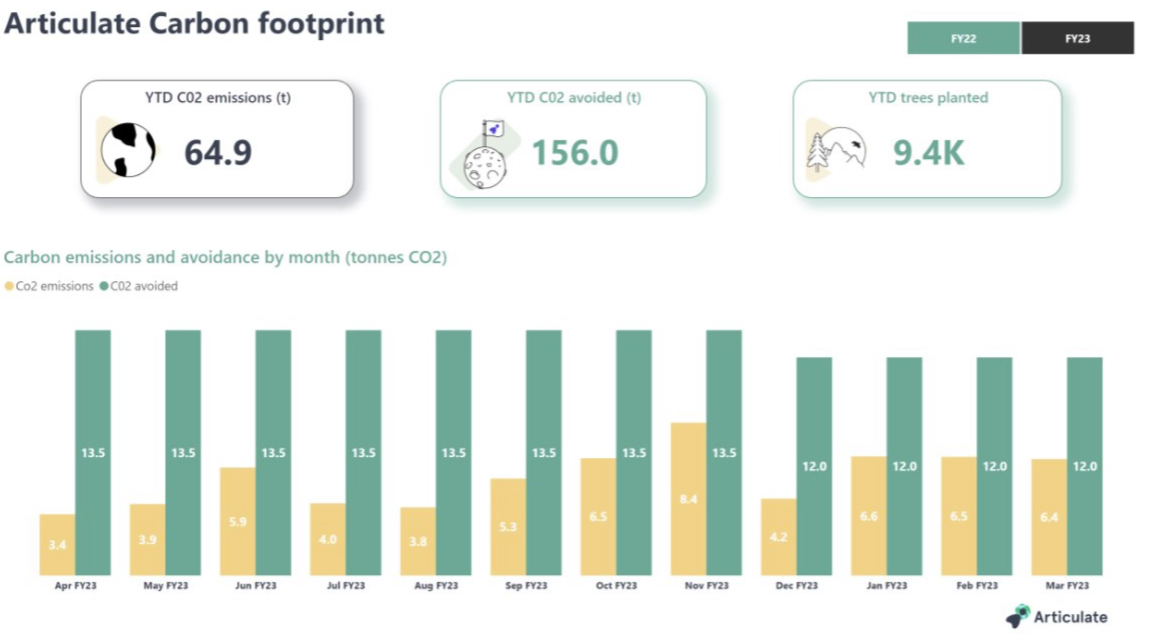
Our carbon footprint for FY22-23
In the financial year 2022-23 we produced 64.9 tCO2e (note, there were some gaps in this data), offset 156 tCO2e and planted 9400 trees.
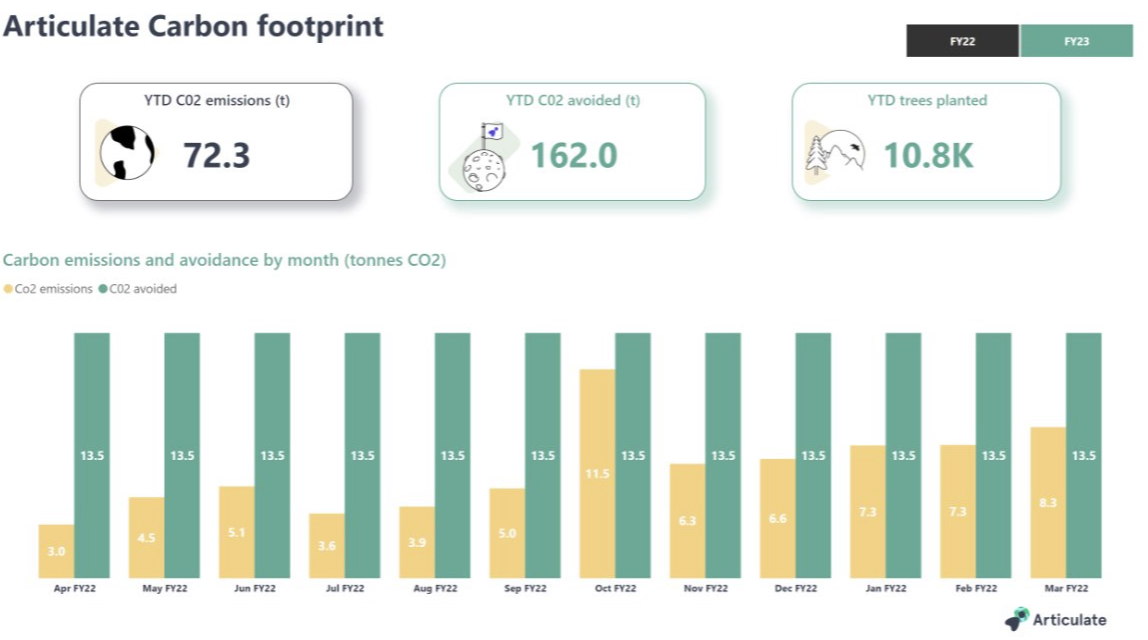
Our carbon footprint for FY23-24
In the financial year 2023-24 we produced 72.3 tCO2e (note, we are more confident in this figure than last f/y), offset 162 tCO2e and planted 10800 trees.
Scope 1 greenhouse gas emissions are the direct emissions generated by the business, such as through assets like buildings or cars, or processes like manufacturing, transportation or other activities. Scope 2 emissions are indirect emissions from buying energy from a utility provider, such as electricity for heating.
Many businesses produce scope 1 and 2 emissions simply by having and running an office building. As an agency that has been remote working since its inception 20 years ago, we do not have an office. And, we do not manufacture or transport a physical product, but rather offer digital marketing and website services. This all means that our scope 1 and 2 emissions are essentially non-existent, as homeworking, use of technology and supplier-based GHG emissions are covered under scope 3. Of course, as individuals, it is up to each of the employees at Articulate to reduce wastage in the home, turn out lights or turn off devices on standby and to use green energy providers where possible. As a company, we regularly discuss these topics and offer advice for those looking to be more sustainable in the home.
Scope 3 emissions are all indirect GHG emissions not covered by scope 2, which is essentially supply chain emissions (both upstream and downstream). In the current model, which may change, it also covers remote working and the use of technology. For most businesses, scope 3 emissions account for 88 percent of total emissions and, therefore, represent a major opportunity for emissions reduction and offsetting.
As a remote-working business, employees do not commute every day, but we do occasionally travel to meet in person or for other meetings. We offset all travel and have done so for the past five years. We have also greatly reduced the amount of travel during and after the COVID-19 pandemic. And, while we will talk more about suppliers shortly, we also created one of our “suppliers”, Turbine, our sister company in 2010. This digital platform is for paper-free expenses and time off requests. It helps Articulate be as paperless as possible, along with every other business that has purchased the software.
We calculated our emissions for the financial year 2022-23 as 64.9 tCO2e, with the caveat that some emissions may not have been accurately or fully accounted for. We are more confident that our number for the financial year 2023-24 is correct, at 72.3 tCO2e, meaning our avoidance efforts (more than 300 tCO2e in those two years) cover more than double our emissions. Our work from home data is included in our total footprint in Scope 3.
As we get better, more accurate measurements, these numbers will likely become more reliable over time. This is something we’re working towards in 2024. Our efforts have been moderated by the For Our Planet Ecologi awards (although beyond the scope of this report which covers up to the end of the financial year March 2024, we have in fact recently achieved Ecologi’s ‘For Our Planet’ Silver Award 2024! So that’s the first addition to next year’s report already…).
Several of our policies in the employee handbook relate to sustainability and the planet. In particular, the ‘Environmental stewardship’, ‘Corporate Social Responsibility’ and ‘Human rights’ policies. These codify our efforts to promote sustainability, such as by promoting energy efficiency in home offices, recycling, using non-harmful products and advocating for the use of public transport over cars or taxis when travelling. Employees are also encouraged to use their volunteering days for environmental action, such as organised clean-ups or community gardening.
Another policy that supports our efforts to be more sustainable is our ‘Local and ethical purchasing’ policy. This states that ‘we aim to use our purchasing power to support local and ethical businesses, responsibly sourced materials, goods and services and to reduce our environmental impact.’ As far as possible, we purchase goods, products and services locally and buy from fellow B Corps or otherwise ethical businesses, such as Fairtrade organisations.
We try to use digital providers that are equally committed to sustainability. For example, we use Microsoft 365 for much of our work, such as using Teams for meetings. Microsoft is carbon neutral and aims to remove from the environment all the carbon the company has ever emitted by 2050. Looking ahead, we’re working on clarifying our approved and non-approved supplier lists and noting where it has proven difficult to avoid less sustainable suppliers.
At the start of the financial year in 2023, we made a commitment to seeking out what we call ‘Tech for Good’ clients. That is, purposeful, ambitious B2B technology companies in key sectors such as health, environment and education. While we have historically long served customers in these industries, this was the first concerted effort to attract such clients. As such, we created marketing campaigns and sales processes to deliberately seek out clients in those areas, for example by targeting B Corps and by joining The Agency Collective (another B Corp).
This has shifted our client mix. Amongst all former clients, 11 percent of clients were in this specifically ‘Tech for Good’ category. For the last financial year, 38 percent of clients have been in this category. Clients in this category have included Michelmersh, Concord and Ecologi. Not only has this proven financially sustainable, but it also means that the work we do as marketers and brand experts further extends the reach of these companies who do such good for People and Planet. We are looking to increase that percentage substantially in the next financial year.
Over the years, we’ve run a number of sustainability initiatives, particularly around awareness raising. For example, we ran regular internal SDG Lunch and Learn talks throughout 2023 and the start of 2024, many of which touched on sustainable best practices around energy efficiency, food waste and purchasing, and more. We have also contributed to 27 sustainability projects so far with Ecologi, from a solar power project in Morocco to conserving the Amazon in Brazil.
As part of a B Corp Month initiative in 2023, we took part in the DoNation campaign where employees pledged climate saving activities. Our CEO also took part in Ecologi’s World Earth Day marketing campaign, joining in the video to #SaveOurPlanet.
Through the provision of paid volunteering days, employees have taken part in various community initiatives on their own as well. One employee ran craft groups at the local library during the Winter snap of 2022-23, as part of a local drive to welcome people to ‘warm spaces’ and save on heating. Our CEO has joined a local action group campaigning against river pollution and spent volunteer time building a website for the local waterways. While uptake on volunteering days for such initiatives has not been as much as we’d like, this is something we’re looking to really push in the next year.
The Articulate tree-hugging really began 14 years ago when we built Turbine, our answer to paper-free expenses, purchase orders and time-off requests as part of the digital workplace. From there, as a company, we’ve contributed over £500 to The Woodland Trust in 2022 and signed up to Ecologi, as we’ve mentioned.
Ecologi has allowed us to fund the planting of somewhere in the region of 20 thousand trees (at the time of writing), all over the world. Through a clever integration, we have set up a system whereby we plant a tree when site visitors fill in a form on our website. To date, more than 7,300 contacts in our database have contributed to our Articulate forest, which will long outlive us! For a company of our size, and over the course of just two years, this is an absolutely huge achievement. Very few organisations of 20 people can say they’ve had 1,000 trees planted per person. All this is ongoing, but to mark the progress of our journey we also recently adopted an ancient secular beech in the Forest of Immortal Stories in Romania.
As we mentioned, our total carbon emissions over the last two financial years, which is the period for which we have relatively reliable data, is 137.2 tCO2e according to Ecologi’s calculator. Of that, around a third is attributable to remote work, and the rest to suppliers and technologies. We calculated the cost of each remote worker by using Ecologi’s recommendations:
‘Ecologi Zero combines average UK household energy data with how many days your employees work from home, to calculate the increased energy demand and associated emissions from home office equipment and heating.’
It may be that the actual amount differs from the UK averages. At the moment, however, we are unable to track individual carbon footprints, and this is something we’re looking to investigate in the next year.
As we mentioned, in that time period of two years we offset (or ‘avoided’, see below) more than twice as much carbon as we produced — 300 tonnes — making us a Climate Positive Employer. This is one of our proudest achievements. We offset more carbon than we use. Not only are we doing the bare minimum, but we are going above and beyond to have a positive impact.
There is a lot of debate around the terms carbon neutral, offsetting and removal. To be dubbed ‘carbon neutral’ requires a certification process, which we have not yet gone through, although we believe based on the data that we more than qualify.
In our case, as has become common usage, we take offsetting to mean ‘avoiding’: action that prevents a carbon-emitting activity from happening. How this works is that a project developer can create a development, like a solar farm, and be assessed by a carbon standards organisation on the real-world reduction of carbon that this project will have on the planet, as measured by tonnes of carbon dioxide (tCO2) or tonnes of carbon dioxide equivalent (tCO2e). They then receive carbon credits equivalent to that amount, which can be sold on, or as Ecologi put it ‘credits provide a vehicle for converting money into climate impact.’ That is how Articulate offsets or ‘avoids’ carbon, by purchasing carbon credits.
The third term, carbon removal, refers to emissions that have been removed from the atmosphere and stored, such as via carbon capture and burial. There are very few such initiatives in place at scale. Most are in a testing phase, making carbon removal credits much more expensive. This is why the emphasis should be on reduction at this stage, while these technologies develop. It is reducing carbon footprints that will make the most impact on the climate, today, and therefore we do not, largely, rely on carbon removal as a business.
On 26 June 2022, we committed to Net Zero by 2030. But the truth is, we’ve been on this journey for a lot longer than that. Our goal is to achieve Net Zero status as quickly as possible, so if we can get there before 2030, then that’s what we will do. That means reducing our carbon footprint as much as possible and offsetting (or removing) the rest.
Moving forward, our mission is to track our carbon outputs more accurately and find ways to reduce these further, such as by being even more discerning about our suppliers and by supporting employees in reducing individual carbon footprints at home. With better data and due diligence, we can make those incremental changes that will get us to Net Zero. As such, we’re using Ecologi’s relatively new Net Zero tracking technology and Power BI to help us track month-on-month carbon outputs and offsets.
Looking ahead
As we’ve said, we have six targets that we are aiming to complete in the 2024-25 financial year, all while continuing to offset our carbon and plant thousands of trees.
This is where we’re heading next. We’ll keep you in the loop on our progress:
6 roundtables per year
Pillar: Prosperity
SDG: 8) Decent work and economic growth
4 allyships on employability-related areas
Pillar: Prosperity
SDG: 8) Decent work and economic growth
Fair pay charter with 20 sign-ups
Pillar: People
SDG: 1) No poverty
2 physical and 2 mental health champions
Pillar: People
SDG: 3) Good health and wellbeing
75 percent of learning days used
Pillar: People
SDG: 4) Quality education
Reduce our Scope 2 emissions by 5 percent
Pillar: Planet
SDG: 13) Climate action
In creating this report we became acutely aware of gaps in our data and areas where we need to focus our attention. In that sense, it’s done its job. And, hopefully, it has informed and inspired readers outside our organisation to take action for People and Planet. Thank you for reading.
While this first report published in 2024 will live on as a snapshot of our journey so far, we plan to produce annual reports from this point on with updates on all of our targets. So, look out for next year’s report and any updates along the way, which can be found on our blog and on this page.
Until then, that’s all folks!